SRMAP Departmental Events
- Who invented this? On the origin of disruptive technologies December 16, 2021
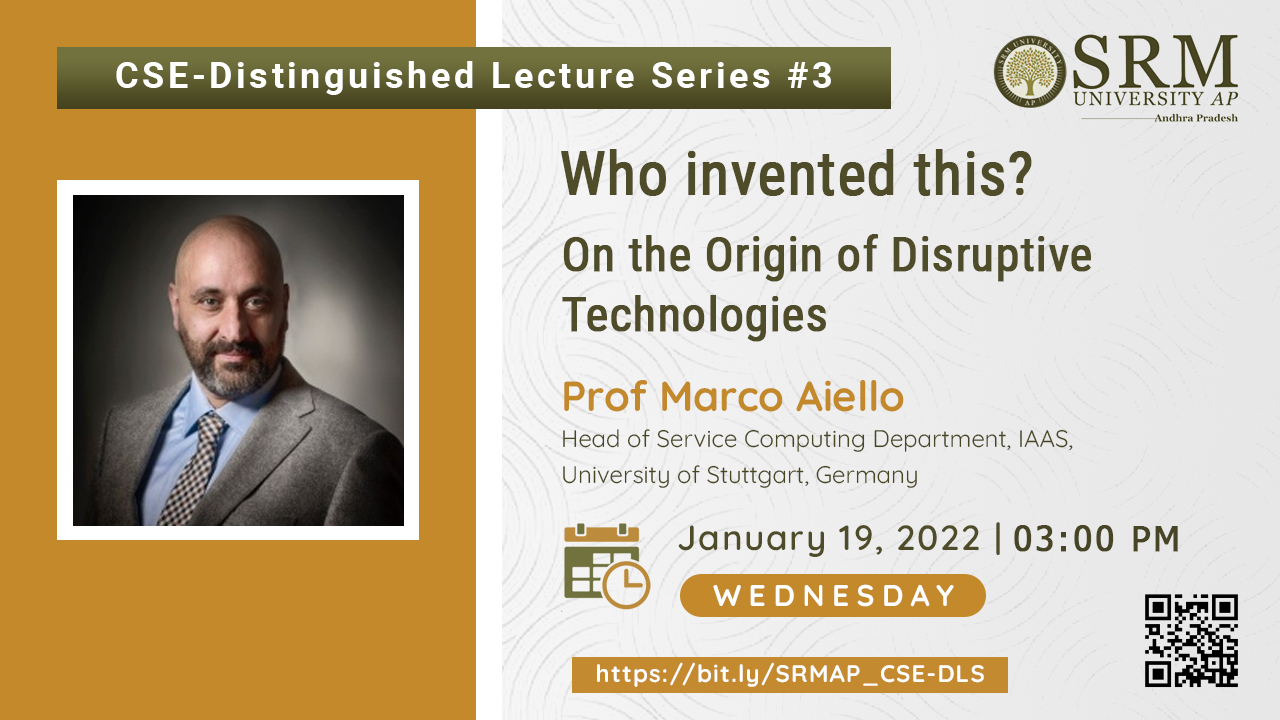
The Department of Computer Science and Engineering at SRM University-AP is organising the third lecture in the Distinguished Lecture Series on January 19, 2022, at 03.00 pm through virtual mode.
Prof Dr Marco Aiello, Head of Service Computing Department, IAAS in the University of Stuttgart, Germany, will be the esteemed speaker elaborating on the topic “Who invented this? On the Origin of Disruptive Technologies”.
The birth and evolution of ICT have been constellated by radical and rapid innovation originating from all kinds of sources. The Internet resulted from an effort started by the American government, Bluetooth came from a large European company, and the Web sprouted from a personal project of a CERN employee. In this talk, I will pick from the short but incredibly dense history of ICT to reflect on the evolution of innovation under the lenses of amateurism versus large scale, professional designs. In doing so, my main attention will be devoted to the Internet, the Web, and Service-Oriented Architectures.
Biography of Prof Dr Marco Aiello, University of Stuttgart, Germany
Marco Aiello is a professor of Computer Science and Head of the Service Computing Department at the University of Stuttgart, Germany. An elected member of the European Academy of Sciences and Arts, he is an honorary professor of Distributed Systems at the University of Groningen, The Netherlands, where he was a faculty member from 2006 till 2018. He holds a PhD in Logic from the University of Amsterdam, the Habilitation in Applied Informatics from TU Wien, and a master degree in Engineering from the La Sapienza University of Rome. His research interests are in Service Computing, Smart Energy Systems, Smart Buildings, and Spatial Reasoning. He is a member of the Scientific Advisory Board for Informatics of the Lorentz Center, Leiden, The Netherlands and Steering committee Faculty of Exact Sciences, University of Modena and Reggio Emilia, Italy. He has been a board member of the start-up Nerdalize BV, The Netherlands and Visiting Fellow of Macquarie University, Australia.
He has authored over 190 peer-reviewed articles and several books, including two bestsellers, and the most recent “The Web Was Done by Amateurs: A Reflection on One of the Largest Collective Systems Ever Engineered” published by Springer-Nature. He is a steering committee chair of the Service-Oriented Computing and Applications (SOCA) Conference. He has delivered several invited/panel talks at reputed conferences and workshops. He is the Editorial Board of various reputed journals like Energy Informatics (Springer), Journal on Service-Oriented Computing and Applications (Springer), International Journal of Web Services Research (IJWSR), Annals of Computer Science and Information Systems. He was the Information Director of the Transactions on Computational Logic of the Association of Computing Machinery (ACM) from its foundation in 2000 until 2014. He has got several awards and recognitions. He has executed 12 research projects. Since 2006, he has been investigating Service-centric software engineering, Smart energy cities, Energy-aware buildings, Energy-aware data centres and many more.
Stay tuned, and don’t forget to participate in this invigorating session on January 19, 2022.
Continue reading → - On Applications of Machine Learning Methods in Physics December 8, 2021
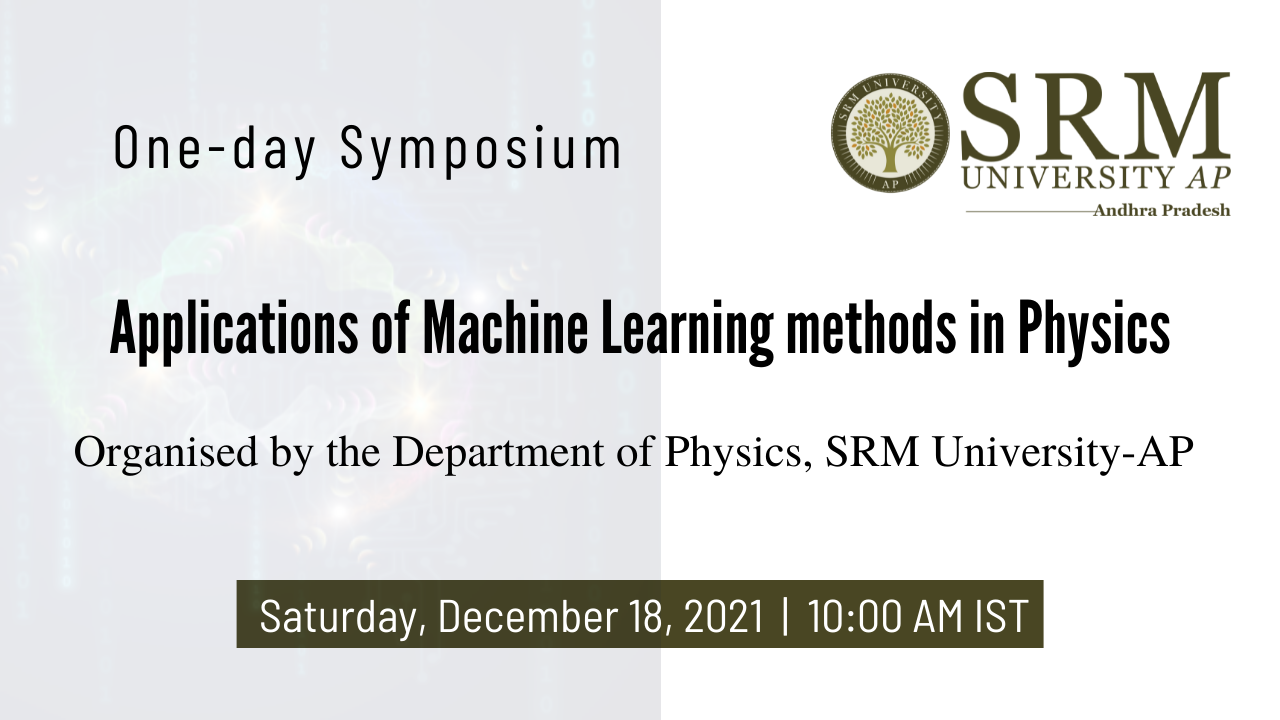
The Department of Physics at SRM University-AP is organising a one-day symposium with national and international academicians on the theme Applications of Machine Learning Methods in Physics. The programme which will begin at 10.00 am on December 18, 2021, will deeply look into two domains of research, namely Particle Physics and Statistical Physics. Eminent experts from computer science and physics domains will deliver talks for a wider audience, especially for students of basic sciences and engineering streams. The event is going to be entirely through Online mode. Dr Amit Chakraborty and Dr Soumyajyoti Biswas from the Department of Physics, SRM University-AP are the conveners of the symposium.
Programme Schedule of the Invited Lectures:
Time: 10.05 – 11.05 AM (IST)
Speaker: Prof Vineeth N Balasubramanian (IIT Hyderabad)
Title: Explainable Deep Learning: Overview, Trends and ChallengesAbstract: The last decade has seen rapid strides in Artificial Intelligence (AI) moving from being a fantasy to a reality that is a part of each one of our lives, embedded in various technologies. A catalyst of this rapid uptake has been the enormous success of deep learning methods for addressing problems in various domains including computer vision, natural language processing, and speech understanding. However, as AI makes its way into risk-sensitive and safety-critical applications such as healthcare, aerospace and finance, it is essential for AI models to not only make predictions but also be able to explain their predictions. This talk will introduce the audience to this increasingly important area of explainable AI, describe salient methods in explainable deep learning, discuss open challenges as well as present some of our recent research in this domain.
Time: 11.30 AM – 12.30 PM (IST)
Speaker: Dr Girish Varma (IIIT Hyderabad)
Title: Deep Generative Methods and ApplicationsAbstract: Generative methods deals with the modelling of complex high dimensional probability distributions. With the advent of deep neural networks, these methods have become more common with the discovery of new techniques like GANs. Such methods can learn to generate images, graphs etc even without using labelled data. In this talk, we will give some of the common deep generative modelling techniques like GANs, Variational Autoencoders, Normalizing Flows. We will also look at some example applications in Style Transfer, Super Resolution in Computer Vision, Conditional Generation of Molecules in Physics etc.
Time: 2.00 – 3.00 PM (IST)
Speaker: Dr Sanmay Ganguly (University of Tokyo, Japan)
Title: The Deep Relation Between Particle Physics and Machine LearningAbstract: At the CERN Large Hadron Collider (LHC) experiment, trillions of protons get smashed with each other at very high energies every second. Remnants of this collision are collected and studied to infer what fundamental interactions are happening at the core. Analysing and extracting meaningful physics information out of this large data is a highly challenging statistical analysis, part of which has to be carried out in real-time. Modern deep learning techniques have brought a change in paradigm in the whole field, where it is observed that the application of ML truly impacts at all corners. In this presentation the speaker will try to give a general overview of the ongoing ML activities, mainly highlighting the areas in the context of LHC physics and shortly touch other branches of HEP.
Time: 3.30 – 4.30 PM (IST)
Speaker: Prof Lasse Laurson (Tampere University, Finland)
Title: Machine Learning Plastic Deformation of CrystalsAbstract: The speaker will present an overview of our recent efforts to apply machine learning to predict the fluctuating plastic deformation process of small crystals, mediated by the stress-driven motion of dislocations. To this end, we use machine learning to establish mappings between the initial state of a sample and the corresponding stress-strain curve, considering different loading protocols and geometries of the dislocation assembly. He will start with a discussion of machine learning the depinning process of edge dislocation pileups, after which he will consider the problem of machine learning-based prediction of the stress-strain response of two- dimensional systems of discrete dislocations subject to stress-controlled and strain-controlled loading.
Register soon and claim your seats at this one-day international online symposium organised by the Department of Physics, SRM University-AP!!
Continue reading → - Distinguished Lecture Series with Prof Ratnasingham Shivaji December 6, 2021
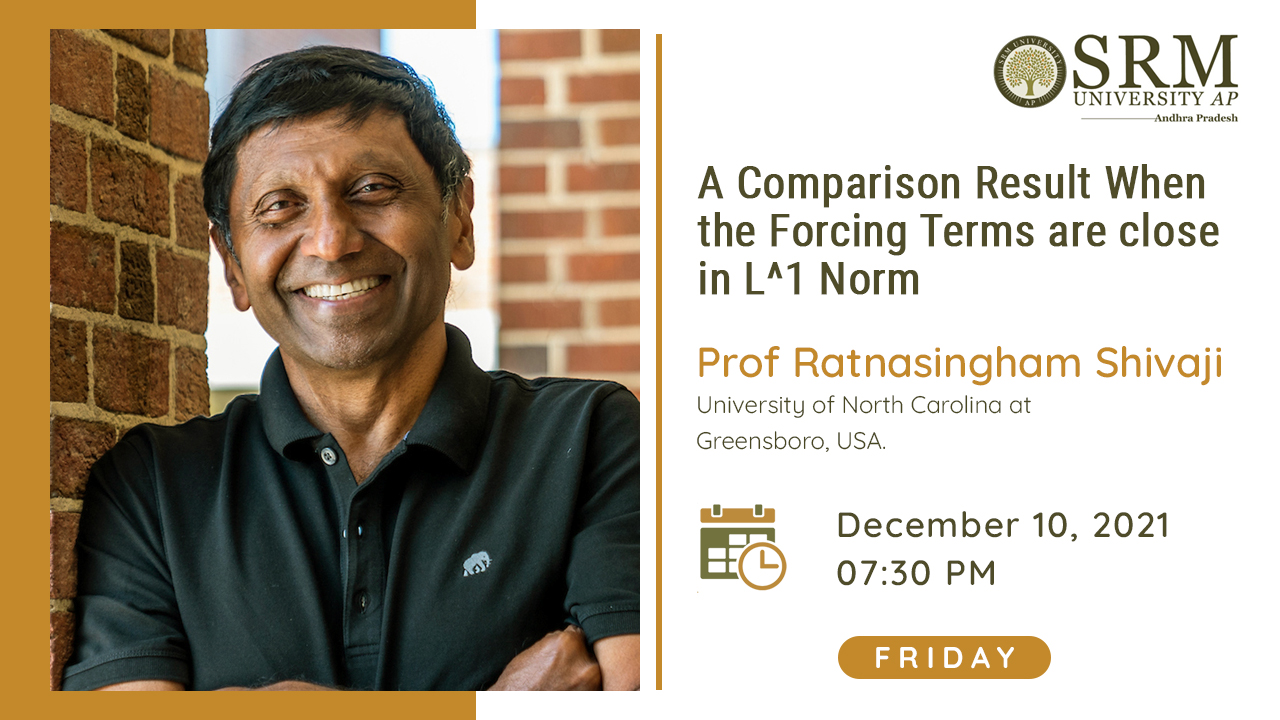 The Department of Mathematics is bringing to you the next thrilling edition of the Distinguished Lecture Series with Prof Ratnasingham Shivaji. Prof Shivaji will take the spotlight on December 10, 2021, at 7.30 pm IST and enlighten us about “A Comparison Result When the Forcing Terms are close in L^1 Norm.”
The Department of Mathematics is bringing to you the next thrilling edition of the Distinguished Lecture Series with Prof Ratnasingham Shivaji. Prof Shivaji will take the spotlight on December 10, 2021, at 7.30 pm IST and enlighten us about “A Comparison Result When the Forcing Terms are close in L^1 Norm.”About the speaker:
Prof. Ratnasingham Shivaji received his PhD in Mathematics from Heriot-Watt University in Edinburgh, Scotland in 1981 and his B.S (first-class honours) from the University of Sri Lanka in 1977. He joined the University of North Carolina at Greensboro (UNCG) on July 1, 2011, as Head of the Department of Mathematics and Statistics and served in this position until July 31, 2019. Beginning in January of 2012, he was named H. Barton Excellence Professor. Prior to joining UNCG, he served for twenty-six years at Mississippi State University (MSU), where he was honoured as a W.L. Giles Distinguished Professor. In 2019, he was also named a Fellow of the American Mathematical Society. He is the recipient of the 2020 Mathematical Association of America (MAA) Southeastern Section Award for Distinguished University Teaching of Mathematics.
Prof. Shivaji’s area of specialization is partial differential equations, particularly in nonlinear elliptic boundary value problems. His research work has applications in combustion theory, chemical reactor theory, and population dynamics, and has been funded by the National Science Foundation and the Simon’s Foundation. Currently, he is serving as the PI on an NSF Math Ecology grant. He has authored one hundred and sixty research papers. He is a member of the Editorial Board of several mathematics journals.
Abstract:
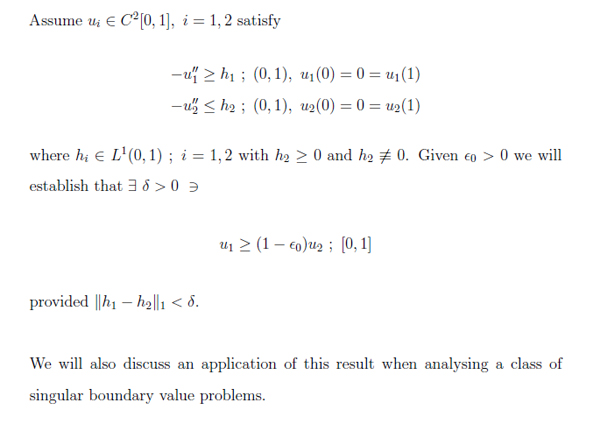
This session would provide a unique opportunity to interact with such a distinguished personality in the field of mathematics. Please make the most of this exciting opportunity on December 10, 2021, at 7.30 pm IST.
Continue reading → - MSV-IV with Shaik Rajak November 27, 2021
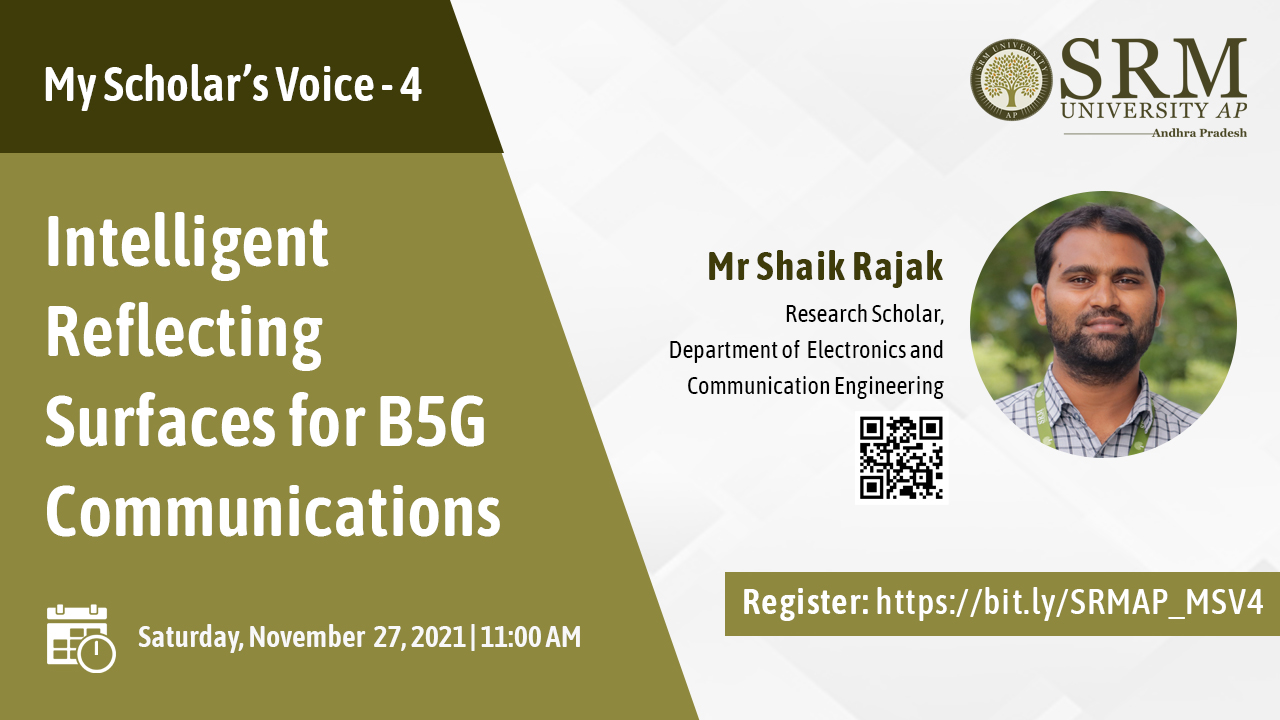 The world of communications is constantly changing. It is transforming, evolving, and becoming better, faster, and smarter. So, for the fourth edition of My Scholar’s Voice (MSV-IV) we would like to present Shaik Rajak from the Department of Electronics and Communications Engineering for a titillating discussion on “Intelligent Reflecting Surfaces for B5G Communications” on Saturday, November 27, 2021, at 11.00 am.
The world of communications is constantly changing. It is transforming, evolving, and becoming better, faster, and smarter. So, for the fourth edition of My Scholar’s Voice (MSV-IV) we would like to present Shaik Rajak from the Department of Electronics and Communications Engineering for a titillating discussion on “Intelligent Reflecting Surfaces for B5G Communications” on Saturday, November 27, 2021, at 11.00 am.Shaik Rajak will give us an insight into the future with communications with his talk. He will elaborate in this session on the importance of his research. He will talk about the scopes of implementation as well as further research that can follow his work. It would be really beneficial to learn about the developing phase of communication research to make an informed decision while choosing research or career plans.
About the speaker:
Shaik Rajak received his B. Tech degree in Electronics and Communication Engineering from JNTU, Hyderabad in 2013. He completed his M.Tech. in Electronics and Communication Engineering, JNTU Hyderabad in 2016 and is currently working towards the PhD at the School of Engineering And Science (SEAS), SRM University-AP, Andhra Pradesh, India. Before joining SRM University-AP, he worked as a lecturer for a year in QIS College of Engineering and Technology (QISCET), Andhra Pradesh. He was awarded a gold medal for the paper presentation organized by SRM University-AP. His current research interests include the Internet of Things, beyond 5G communications, Intelligent Reflecting Surfaces, Millimeter-wave, Massive MIMO, OMA, and NOMA schemes.
So, take a seat and be a part of this amazing session on Saturday, November 27, 2021, at 11.00 am to hear from Shaik Rajak’s voice in MSV-IV.
Continue reading → - Jairam Ramesh: On the journey of writing November 23, 2021
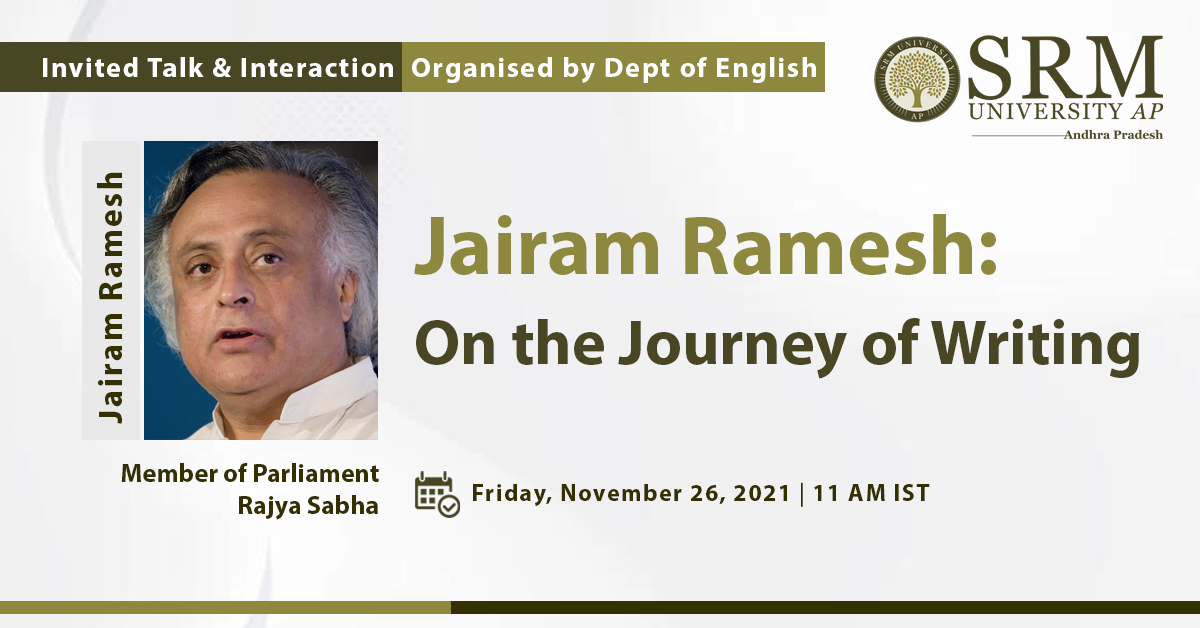 The Department of English at SRM University-AP invites you to an engaging webinar on November 26, 2021, at 11.00 am. Mr Jairam Ramesh, Member of Parliament representing the state of Andhra Pradesh, will be the guest speaker of the day.
The Department of English at SRM University-AP invites you to an engaging webinar on November 26, 2021, at 11.00 am. Mr Jairam Ramesh, Member of Parliament representing the state of Andhra Pradesh, will be the guest speaker of the day.Writing is a process of pain and pleasure. Every writer approaches, experiences, and survives it in a unique way. In this talk and interaction, Mr Jairam Ramesh would share his idea and process of writing. His talk would be followed by an interaction about his latest book The Light of Asia: The Poem That Defined The Buddha (Penguin, 2021). The talk is intended to be a part of the Department’s larger initiative to organise interactions around “Language and Society” to address all kinds of conversations about language, communication, writing, speaking, thinking, and at a deeper level, about connecting with others.
About the Speaker:
Jairam Ramesh is presently a Member of Parliament and Chairman of Parliament’s Standing Committee on Science and Technology, Environment, Forests and Climate Change. He was Union Minister between 2006 and 2014 and held several portfolios including Commerce, Power, Environment and Forests, Drinking Water and Sanitation and Rural Development. He played a key role in global climate change negotiations in 2009 and 2010. He is also the author of several well-known books some of which are Green Signals: Ecology, Growth and Democracy in India, Old History, New Geography: Bifurcating Andhra Pradesh, To the Brink and Back: India’s 1991 Story, Indira Gandhi: A Life in Nature, Intertwined Lives: PN Haksar and Indira Gandhi, A Chequered Brilliance: The Many Lives of V.K. Krishna Menon and The Light of Asia: The Poem that defined the Buddha.
We encourage you to make use of this exclusive opportunity to interact with Mr Jairam Ramesh and understand the nuances of the writing process on November 26, 2021, at 11.00 am.
Continue reading →

